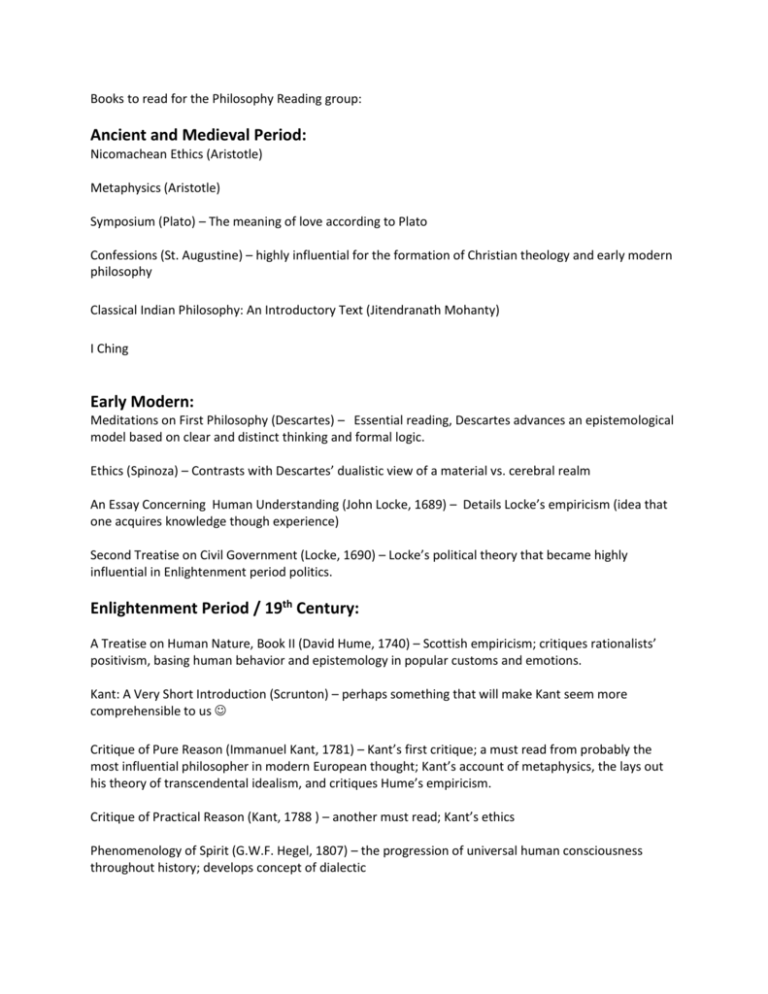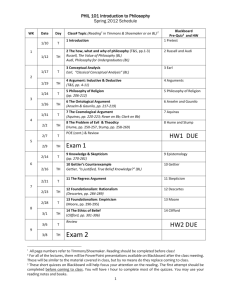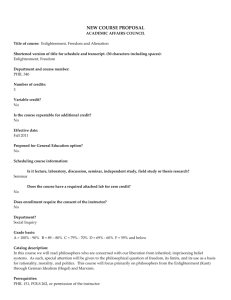Books to read for the Philosophy Reading group:
advertisement

Books to read for the Philosophy Reading group: Ancient and Medieval Period: Nicomachean Ethics (Aristotle) Metaphysics (Aristotle) Symposium (Plato) – The meaning of love according to Plato Confessions (St. Augustine) – highly influential for the formation of Christian theology and early modern philosophy Classical Indian Philosophy: An Introductory Text (Jitendranath Mohanty) I Ching Early Modern: Meditations on First Philosophy (Descartes) – Essential reading, Descartes advances an epistemological model based on clear and distinct thinking and formal logic. Ethics (Spinoza) – Contrasts with Descartes’ dualistic view of a material vs. cerebral realm An Essay Concerning Human Understanding (John Locke, 1689) – Details Locke’s empiricism (idea that one acquires knowledge though experience) Second Treatise on Civil Government (Locke, 1690) – Locke’s political theory that became highly influential in Enlightenment period politics. Enlightenment Period / 19th Century: A Treatise on Human Nature, Book II (David Hume, 1740) – Scottish empiricism; critiques rationalists’ positivism, basing human behavior and epistemology in popular customs and emotions. Kant: A Very Short Introduction (Scrunton) – perhaps something that will make Kant seem more comprehensible to us Critique of Pure Reason (Immanuel Kant, 1781) – Kant’s first critique; a must read from probably the most influential philosopher in modern European thought; Kant’s account of metaphysics, the lays out his theory of transcendental idealism, and critiques Hume’s empiricism. Critique of Practical Reason (Kant, 1788 ) – another must read; Kant’s ethics Phenomenology of Spirit (G.W.F. Hegel, 1807) – the progression of universal human consciousness throughout history; develops concept of dialectic Das Kapital (Karl Marx) – Marx used Hegelian dialectical reasoning to demonstrate the relationship between economics and social progress. Critiques social outcomes of capitalism. Hegel and Modern Society (Charles Taylor) Beyond Good and Evil (Nietzsche) – Nietzsche’s (often humorous) polemics against his contemporaries and past philosophers. Nietzsche is particularly critical of modern philosophers’ use of Christian theology as the foundation of their metaphysical, epistemic, and ethical theories. Thus Spoke Zarathustra (Nietzsche) – themes of eternal reoccurance and the “over-Man” explored. Highly critical of Judeo-Christian moral traditions. The Metaphysical Club (Louis Menand) – a historical account of the formation of American Pragmatism The Varieties of Religious Experience (William James) Democracy and Education: An Introduction to the Philosophy of Education (John Dewey) – Dewey calls for a reform of the educational system. Dewey argues that education ought to prepare youth to live in a democratic society and responsibilities/freedoms that implies. He emphasizes experimental thinking and pluralism long before the advent of postructuralism. Experience and Nature (John Dewey) – Dewey develops the epistemic theory of transaction. Art as Experience (John Dewey, 1934) – Dewey seeks to transform popular viewpoints in aesthetics from an emphasis on the art object to the experience of creating art and being a spectator of art. Brothers Karamazov (Fyodor Dostoyevsky) – Dostoyvsky is a Russian writer who explored similar themes to those that appear in Neitzsche’s work. Considered an existentialist work, BK is famous of the story of the Grand Inquisitor. Philosophies of Art and Beauty: Selected Readings from Plato To Heidegger (Albert Hofstadter and Richard Kuhns) Contemporary: Logical Investigations (Edmund Husserl, 1900) – introduces phenomenology, divorcing meaning from being. Breaks away from logical positivism. Being and Time (Martin Heidegger) – Explores being from a phenomenological perspective (“being there”) and authenticity. Philosophical Investigations (Ludwig Wittgenstein) – Anyone who thinks that logic can solve all the problems of philosophy should read this. Wittgenstein critiques the way philosophers have reduced language to logic and, by doing so, separated language from its context/complexities in philosophical arguments (thereby distorting them). Discipline and Punish (Foucault) – poststructuralism; talks about the anthropology of the transition from the brutal punishment to the reformation of criminals. Foucault loves to explore the relationship between economics and the evolution of ethical ideas, the relationship between power and knowledge, and role the body and conditioning play in knowledge acquisition. Madness and Civilization (Foucault) – another great Foucault classic; talks about history of insanity, its treatment, and questions what it means to be insane. Closer to the Light (Melvin Morse, M.D. with Paul Perry) – case studies of people’s near-death experiences The Wall (Sartre) – Sartre, the most famous figure in atheistic existentialism. The Trial (Kafka) – Story of a man accused of a crime…he’s just not sure what it is he’s done wrong and he spends the whole book trying to figure that out. Explores the isolated state of the modern man. Labyrinths (Jorge Luis Borges) – short stories by this amazing Argentinean writer. Borges is both a philosophical and literary genius; he uses literature to critique modern theories in epistemology and the philosophy of language. Entertaining to read and very deep. The Power of Now (Eckhart Tolle) – Tolle’s works have been on Oprah’s book club. This borrows from Eastern thought and mindfulness to explore the nature of consciousness. It’s also a self-help book. After the End of Art: Contemporary Art at the Pale of History (Arthur Danto) – Danto borrows from Hegel’s “end of history” thesis, applying similar thinking to the Western art conversation. Abuse of Beauty: Aesthetics and the Concept of Art (Danto) On Grammatology (J Derrida, 1967) – Ever wanted to know what deconstruction really means? This guy invented it. I suggest reading de Saussure’s theories on semiotics before attempting to read this book. Philosophy and the Mirror of Nature (Richard Rorty) – highly controversial text; some have argued that Rorty is a relativist because he argues against a foundationalist approach to epistemology. You be the judge. Philosophy and Social Hope (Richard Rorty) Environmental Ethics: An Anthology (ed. Paul Taylor) – my (Amy’s) ex-advisor at Temple wrote this An Introduction to Africana Philosophy (Lewis Gordon) – Gordon is a Black existential-phenomonologist; he uses the concept of eidos (vs. essence) in phenomenological thought to argue that a common yet fluid identity exists among members of a specific marginalized narrative. He is on the list of top 100 “most dangerous” professors in the US (another Temple guy). The Alchemist (Paulo Coelho) The Mind’s I: Fantasies and Reflections on Self and Soul (anthology) – according to Richard, this book is about artificial intelligence and the complexities surrounding that issue. Beginning Mindfulness (Andrew Weiss) – contemporary psychology A Short History of Ethics: A History of Moral Philosophy from the Homeric Age to the Twentieth Century (Alasdair MacIntyre) – Norte Dame prof. I’ve never read this book, but MacIntyre has argued elsewhere that modernism had basically separated moral philosophy from a human context. He suggests reviving Classical virtue/character ethics. Man for Himself: An Inquiry Into the Psychology of Ethics (Erich Fromm) – German Frankfurt school thinker Philosophical Foundations for a Christian Worldview (J.P. Moreland) Zen and the Art of Motorcycle Maintenance: An Inquiry into Values (Robert M. Pirsig) Experiments in Ethics (Kwame Appiah) The Global New Deal: Economic and Social Human Rights in World Politics (William Felice) Practical Ethics (Peter Singer) – controversial contemporary Harvard philosophy professor who makes great arguments for infanticide and other shocking ideas. The Dialectic of Enlightenment (Horkheimer and Adorno) – Why did one of the most advanced societies in the 1900s fall to Nazism? How could a post-enlightenment era society approve of barbarism? Suggests that Enlightenment thinking contains the seeds to its own contradiction. Attributes the demise of enlightenment ideas like free thinking, democracy, and equality to trends modern popular culture, capitalism, and industrialization – paradoxically, these are also the of fruits of the Enlightenment. AWESOME book. Introducing Critical Theory ( Stuart Sim) – Makes critical theory (a huge school of thought in 19th century literary, political, and social theory) accessible to anyone. One-Dimensional Man: Studies on the Ideology of Advanced Industrial Society (Herbert Marcuse) Introduction to Mein Kamp (Adolf Hitler) The Structural Transformation of the Public Sphere (Jurgen Habermas) – one of the most famous political philosophers in contemporary German thought, Habermas hangs on to Enlightenment ideals and explores what it would take to achieve true ethical consensus. What Everyone Needs to Know About Islam (John Esposito) – thought it might be nice to encourage nonEurocentric readings. The Philosopher and His Poor (Jacques Rancière) – have you ever noticed that most philosophers throughout Western history had the time, the wealth, an/or the patronage to write philosophy day and night? Christianity, Tolerance, and Homosexuality (John Boswell) – How did homosexuality go from being the “manly” thing to do in Rome to socially inacceptable in 20th century Western society. This is an excellent historical analysis of the origins of homophobia in Christian dogma and Western society. Incredibly wellresearched, this Yale author does a historical exegesis to refute common Biblical denouncements of homosexuality and creates a connection between the economic decline of Rome, St. Ambrose’s philosophy, popular medieval myth, etc. and changing cultural perceptions of sexuality. The Feminist Mistake: The Radical Impact of Feminism on Church and Culture (Mary Kassian) – Just to be fair and balanced, I’d like to hear an argument that justifies anti-feminism. Feminist Theory: A Philosophical Anthology (Ann Cudd) – this book is not what you might think of when you hear “feminist.” This has very little to do with women’s rights and is far more concerned with studying and reviving models for epistemic theory that have been deemed “feminine” by modern philosophical standards and it’s polarization of “masculine” and “feminine” thought patterns. From Black Power to Hip-Hop: Racism, Nationalism, and Feminism (Patrica Hill Collins) Nickel and Dimed: On (Not) Getting By in America (Barbara Ehrenreich) – sociology Economic Facts and Fallacies (Thomas Sowell) – in the midst of this economic crisis, I’m sure this would be educational for all of us…it would also be interesting to see if – or should I say – how it is biased. Art Since 1900: Modernism, Anti-modernism, Postmodernism (Hal Foster) Art in Theory 1900-2000: An Anthology of Changing Ideas (Charles Harrison) - huge book…will take a while to read entirely but such a great way to expose yourself to art theory. Pragmatist Aesthetics (Richard Shusterman) - great introduction to aesthetics and topics relevant to late 20th century (low art/high art controversy, “aesthetics of existence,” etc.) Performing Live (Shusterman) – Introduces somaesthetics; definitely interesting from a dancer’s perspective. The Politics of Aesthetics (Jacques Ranciere) Participation (Claire Bishop) – contemporary art theory…I imagine on the subject of participation








